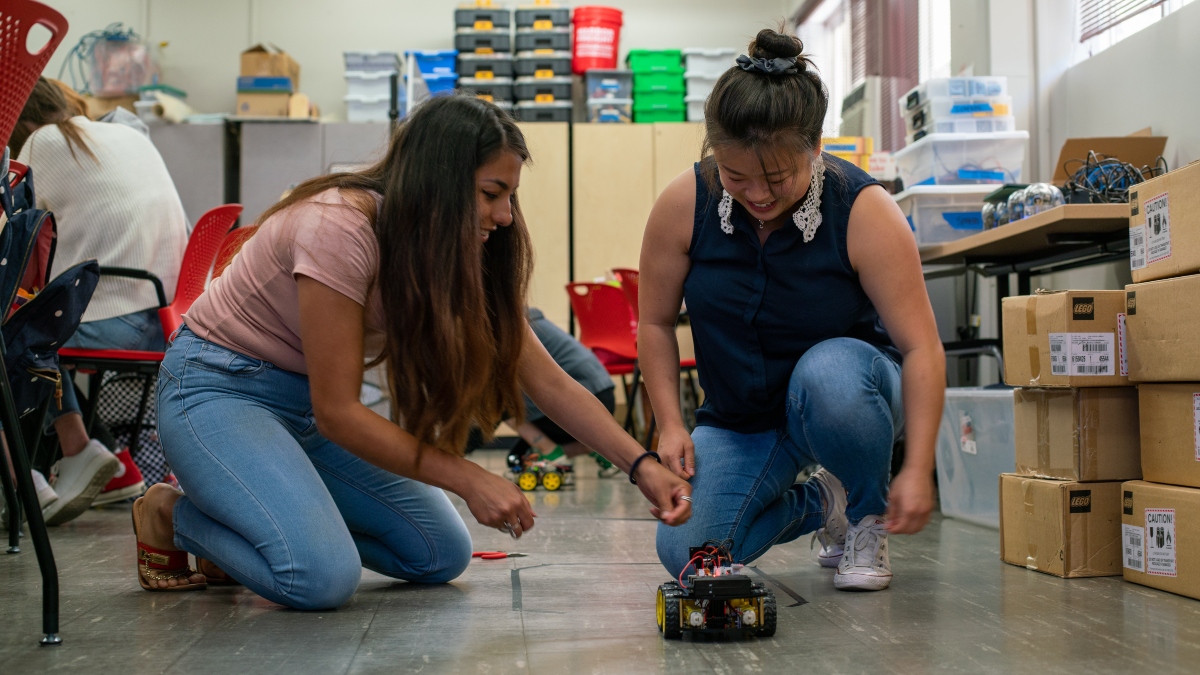 |
| Two San Diego teachers participate in a coding workshop at SDSU. |
During teacher recruitment calls with school district administrators, Donna Ross often hears a touch of desperation when the topic turns to certain subjects.
“The panicked calls come late in summer asking about chemistry and physics,” said Ross, an associate professor of science education at San Diego State University. “Most years, we just don't have applicants for those areas. I'm lucky in my methods course if we have one physics student."
It’s far from a local problem. California has faced a statewide teacher shortage for years, and science teachers are one of the most acute areas of need.
Funded by a new $1.2 million National Science Foundation (NSF) grant, a team of SDSU faculty members is working to put a dent in the shortfall by building a pipeline of highly qualified, social justice-oriented science educators. The Noyce Scholars and Interns Program will provide scholarships, mentorship and professional development to science majors who enter the university’s teaching credential programs.
“Growing the number of science majors in our credential programs is important for our local schools and all the K-12 students who need highly-qualified teachers — so this feels really good," said Ross, who will serve as principal investigator on the grant alongside associate professor Meredith Vaughn and assistant professor Kathleen Schenkel from the School of Teacher Education, and David Pullman, associate professor of physical chemistry.
Over the five years of the grant, 41 credential students will receive $15,000 scholarships on the condition that they go on to teach in a high-need district. The scholarship will revert to a loan if the student does not meet this requirement.
Recruitment for the first cohort of Noyce Scholars is underway, with only students currently in SDSU’s teacher credential programs who already hold science degrees eligible to apply.
In future years, recruitment efforts will ramp up to attract undergraduate and graduate students in the fields of biology, chemistry, geoscience, engineering and physics. To bolster outreach to these majors, the program will launch an internship program next summer in which participants will gain experience teaching science to fifth through eighth graders at a summer camp hosted by nonprofit partner Hands-on Technology (HoT).
The program’s professional development component will focus on implementing technology into the classroom and training around social justice-oriented science teaching — engaging diverse populations of students through science relevant to their communities.
“It's looking for issues that are relevant and meaningful for your students, having them learn the science behind the problems and then exploring ways to make positive change,” Ross said. “It really gets kids interested and motivated in a way that they might not otherwise be.”
“Supporting new teachers when they come through the program is an important piece,” she added. “The more you can support novice teachers, the more likely you are to retain them."
This is SDSU’s second NSF-funded Noyce Scholars program aiming to bring more science majors into the teaching profession. The first, which was awarded in 2014, increased the number of science majors in the university’s credential programs by 63%.
This story was originally published on SDSU NewsCenter.
